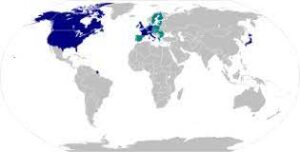The Group of Seven, or G7, is an international organization made up of seven of the world’s largest and most advanced economies. The members of the G7 are the United States, Japan, Germany, France, the United Kingdom, Canada, and Italy. The group was created in the mid-1970s to address economic issues and promote cooperation among its members. In this article, we’ll take a closer look at the G7 and its history, as well as its current activities and impact on the world.

Table of Contents
History of the G7
The G7 was created in 1975, initially as a response to the global economic crisis that had followed the collapse of the Bretton Woods system. The first meeting of the G7 was held in France that same year, and the group quickly established itself as an important forum for discussing economic issues and coordinating policies among its members. Over the years, the G7 has expanded its focus beyond purely economic issues to include topics such as security, environment, and global governance.
The G7’s activities have varied over time, depending on the priorities of its members and the global context. For example, in the 1980s the group played a key role in coordinating efforts to combat inflation and stabilize exchange rates. In the 1990s, the G7 focused more on issues such as trade liberalization and financial sector reform, while also addressing challenges such as the collapse of the Soviet Union and the Balkan Wars. More recently, the G7 has taken on issues such as climate change, digital transformation, and the response to the COVID-19 pandemic.
Current activities of the G7
The G7 continues to be an important forum for discussing global issues and coordinating policies among its members. In recent years, the group has focused on a range of topics, including:
- Climate change: It has pledged to work together to reduce greenhouse gas emissions and transition to a low-carbon economy. In 2021, the group committed to cutting emissions in half by 2030 compared to 2010 levels.
- COVID-19 response: It has played a key role in coordinating the global response to the COVID-19 pandemic. In 2021, the group pledged to donate a total of one billion vaccine doses to low- and middle-income countries.
- Digital transformation: It has addressed issues related to the digital economy, including data privacy, cybersecurity, and the regulation of tech companies.
- Gender equality: It has emphasized the importance of promoting gender equality and empowering women and girls, both at home and abroad.
Impact of the G7
The impact of the G7 on the world has been significant, although it has varied over time and depending on the issues at hand. Some of the key contributions of the G7 include:
- Economic stability: It has played a key role in stabilizing the global economy and promoting economic growth, particularly during times of crisis.
- International cooperation: It has fostered international cooperation and helped to establish norms and standards for global governance.
- Crisis response: It has been able to respond quickly and effectively to crises such as the global financial crisis and the COVID-19 pandemic, thanks to its ability to coordinate policies and resources among its members.
- Policy innovation: It has often been at the forefront of policy innovation, introducing new ideas and approaches to address global challenges.
Conclusion
The G7 is a significant international organization that has played an important role in promoting economic stability, international cooperation, and crisis response. While its impact has varied over time and depending on the issues at hand, the G7 continues to be an important forum for discussing global issues and coordinating policies among its members. As the world faces new challenges
Comparison: G7 and G20
| G7 | G20 | |
|---|---|---|
| Number of members | 7 | 20 |
| Members | United States, Japan, Germany, France, UK, Canada, Italy | Argentina, Australia, Brazil, Canada, China, France, Germany, India, Indonesia, Italy, Japan, Mexico, Russia, Saudi Arabia, South Africa, South Korea, Turkey, United Kingdom, United States |
| Economic focus | Advanced economies | Mix of advanced and emerging market economies |
| GDP share | ~ 32% of global GDP | ~ 80% of global GDP |
| Annual meetings | Yes | Yes |
| Established | 1975 | 1999 |
| Purpose | Discuss global economic issues | Discuss global economic issues and promote growth |
| Role | Influential on global economic policies | Key forum for economic cooperation |
| Decision-making | Informal consensus-based | Formal voting-based |
Important Links